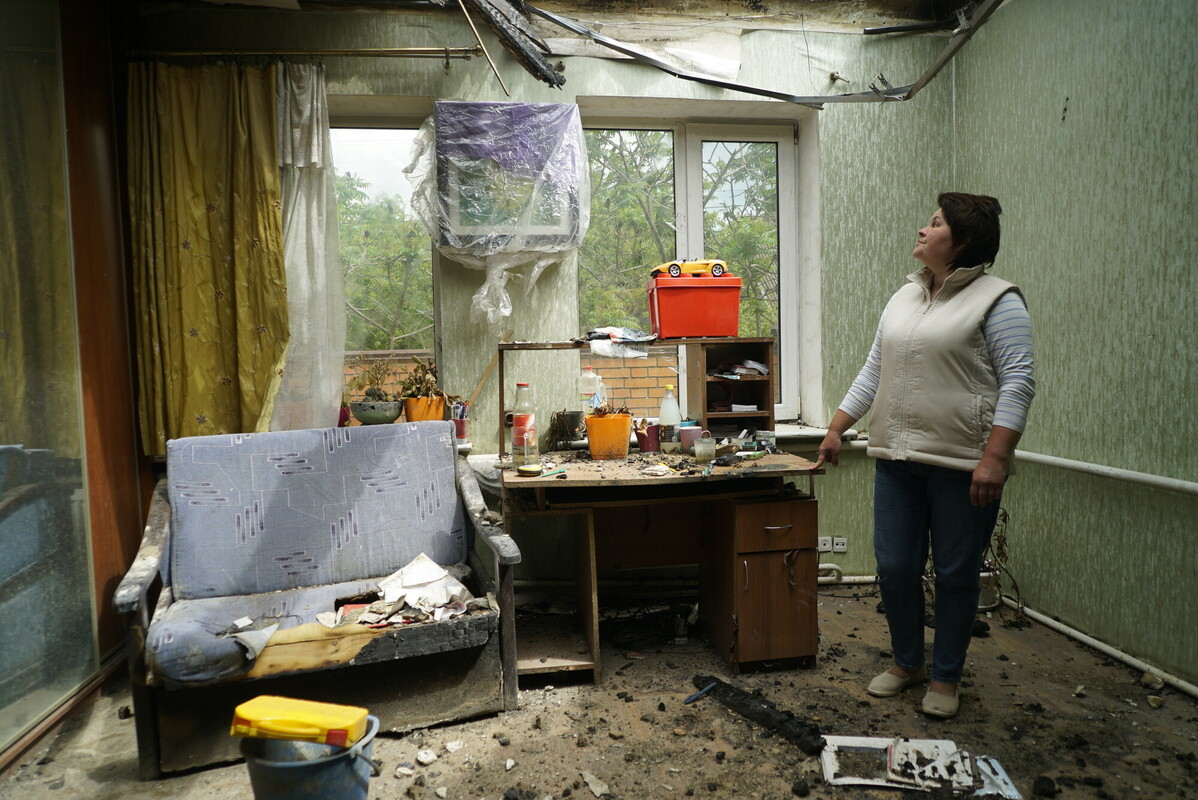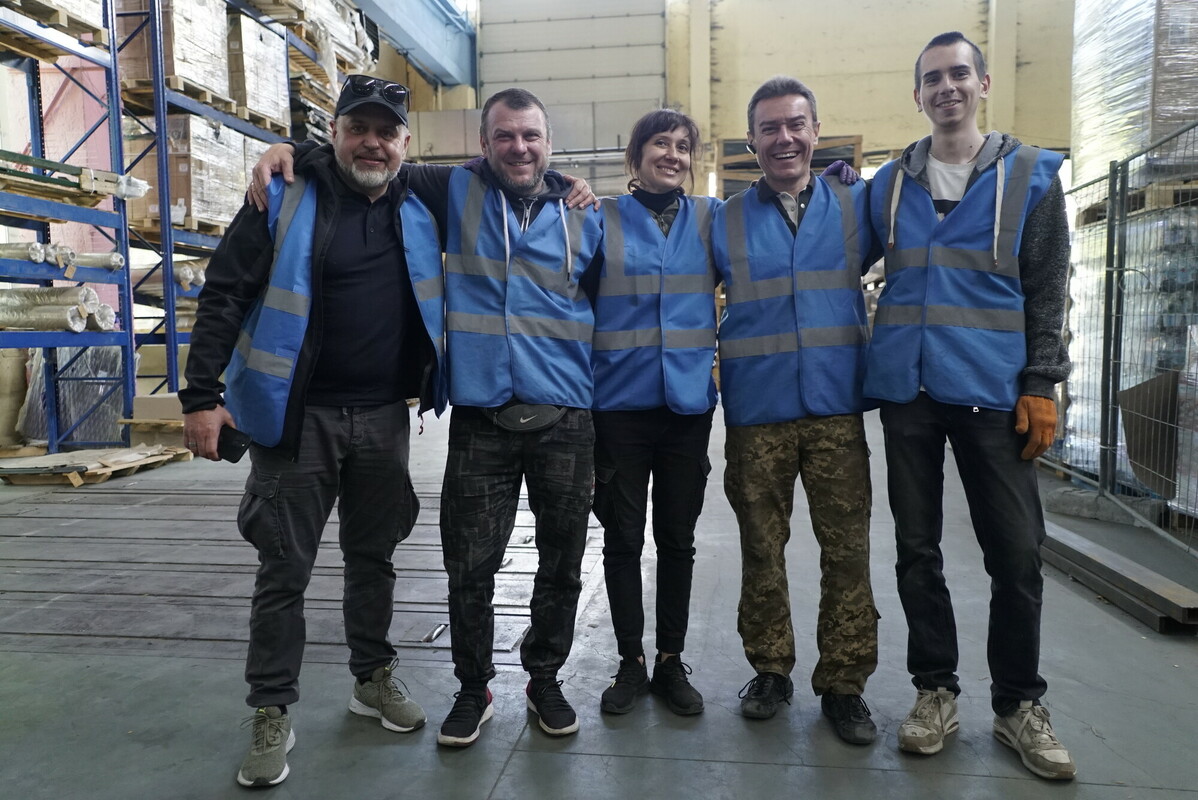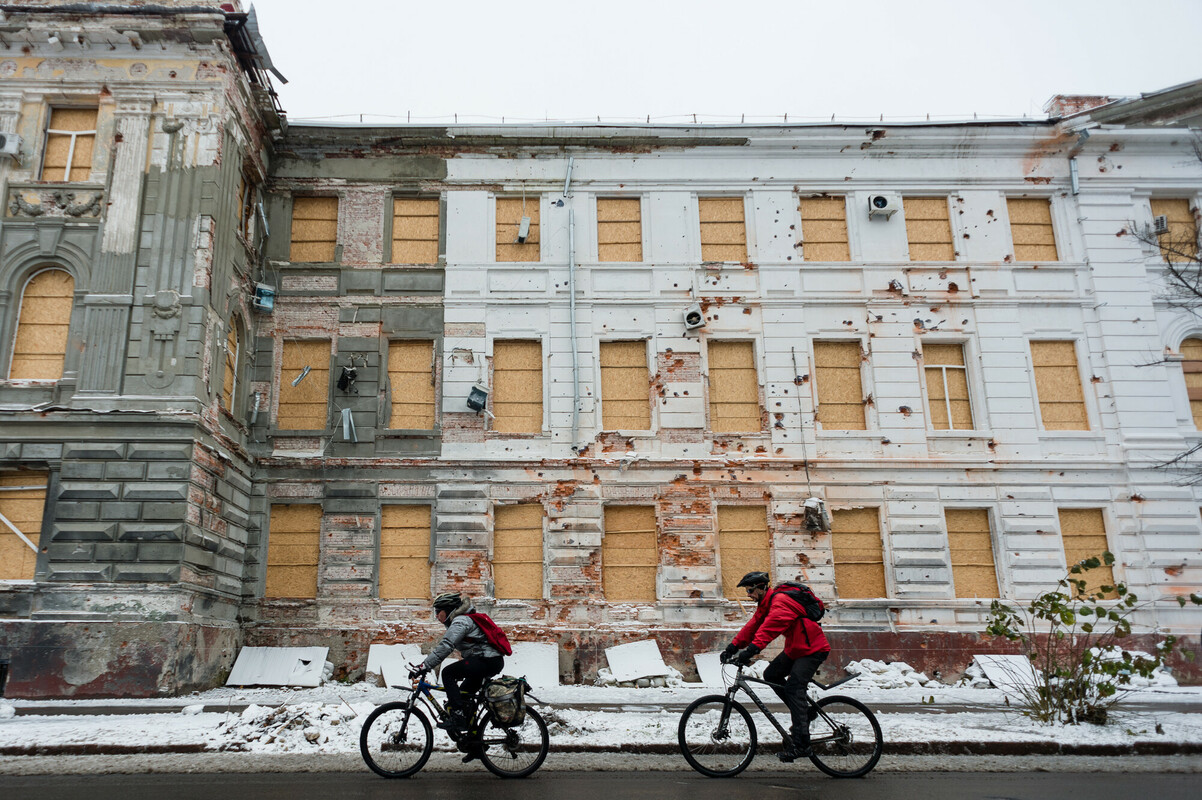“The 24th of March is a date that I will never forget,” said Ivanna*, a therapist from Kharkiv. “My whole family were gathered together when shells hit our house.” The house was engulfed in flames and parts of the roof collapsed. “Nobody was hurt. It was a miracle.”
With their house uninhabitable, Ivanna and her family moved into a flat with family friends, only for it to be hit by shelling as well. Her daughter’s young family moved away to a village in a safer part of Ukraine, but Ivanna decided to stay. “Despite the hardship, I will never leave Kharkiv,” she said. “This is my city.”
Many of Ukraine’s towns and cities found themselves on the frontline of the conflict, with some seeing intense fighting, others enduring months of indiscriminate shelling, and many more being regularly targeted by missile or drone strikes. Countless residential buildings have been damaged or destroyed, with hospitals, water supplies and power networks also hit.

Although many civilians fled, either for the relative safety of Western Ukraine, or across the border to other countries, some, like Ivanna, stayed in spite of the danger. Their reasons ranged from not being able to leave due to immobility or lack of funds, to simply not wanting to leave their homes and property.
“There's a small percentage of the population who there is nothing you can say to them to make them leave,” says Giuliano Stochino-Weiss from HEKS/EPER, partner of DEC charity Christian Aid, who is based in the south-eastern city of Dnipro. “They're going tell you, this is where I was born, this is where my mum has lived, this is where my grandparents have lived. And this is where I'm going to live and die. You can offer buses, suggest ways of evacuation, promises of a warm shelter. But it's their home, and everybody wants to live in their homes, and they opt not to leave. And we must respect that. But we also must find a way to make life as dignified as possible for them.”
Kharkiv, Ukraine’s second largest city, located in the north-east around 15 miles from the border with Russia, has endured months of fighting and shelling. While many of the city’s population of 1.4 million have fled, some have stayed in their homes or moved into underground shelters and metro stations for months at a time.
When local economies grind to a halt as a result of the conflict, accessing basic necessities like food and clean water quickly becomes difficult. From the outset, DEC charity CAFOD funded the local homelessness charity Depaul Ukraine to work in cities across Ukraine, including Kharkiv. Depaul set up distribution points for food parcels, but they quickly realised they couldn’t reach everyone in need this way.

Father Vitaliy Novak of Depaul Ukraine explains: “[Older and disabled people] are not able to move and to get to these official points of distribution of humanitarian aid. So we started to deliver: we bought mini-buses and went around cities, around villages, to those people who are not able to move or walk far, because at the beginning, you know, public transport, it didn't work.” Working with a nutrition expert and feedback from the community, they sourced long-life foods that needed little preparation, and also provided medicines for those who needed them.
Ivanna was among those receiving Depaul’s food deliveries in Kharkiv. “This humanitarian aid helps during this challenging time. It is crucial,” she said. “The volunteers are doing an amazing job.”
Depaul also delivered food and other provisions to people living in underground shelters. Mavka* and her daughter Olesia* ran for their lives when the fighting started with shells exploding nearby. They found shelter in a deep basement with other families, but quickly ran out of food. After calling several organisations said they couldn’t reach them, they got hold of the number for Depaul who quickly came to assess the needs and returned with hot meals.
“We realised someone was helping us, we’re not abandoned,” said Mavka. “They were coming to us through the explosions and bullets.” The aid gave the shelter’s residents the confidence to start to distribute food to others in need.
However, in May 2022, fuel shortages made it increasingly difficult for Depaul to make deliveries. The organisation pivoted, recruiting a team of volunteer cycle couriers through a local bike forum to deliver the food and medicines instead. The cyclists have been supplying regular food baskets to over 700 vulnerable residents in Kharkiv. See them in action in the video below.
Aleksander, 50, one of the volunteer cyclists, had insisted his wife and two daughters leave the country after they found themselves living in a district of Kharkiv that was being heavily shelled. “It was the hardest decision of my life but my family have thankfully found safety in Czechia,” he said.
“After I started to volunteer with the bicycle delivery team, I relocated to stay at the warehouse as it is safer there and there are more people to talk to. As volunteer bicycle couriers we are united by a common goal – to help. We live without making plans for the future. We simply wake up, make our deliveries, spend a couple of hours of free time, and repeat. We are alive, and that is enough to be happy.”
Another DEC-funded project in Kharkiv saw Action Against Hunger work with local business owners to expand a soup kitchen they had set up. The funding enabled them to massively scale up their service, from providing daily meals for 70 people to feeding thousands per day. The cooks often slept in the basement to stay safe from shelling. Action Against Hunger Deputy Country Director Willow Rook says the charity’s food programme is “unique and inspiring” for the sheer variety of settings and actors and modes of delivery they’ve developed, working with businesses to convert company kitchens or restaurants into food hubs.
NGO Girls, a partner of DEC charity ActionAid, has a base in the south-eastern city of Dnipro which they use to reach people in various areas of eastern Ukraine near the frontlines of the conflict. “From Dnipro we can also operate in Kharkiv oblast or Zaporizhzha oblast because it's not so far,” says Yuliya Sporysh, the organisation’s CEO. “And you can deliver goods here very quickly. When it's possible, and when we can go to freshly re-occupied territories, we also go,” she added, referring to territory recently regained by Ukrainian troops.
While in many areas directly affected by the conflict distributing food parcels or hot meals has been the most appropriate form of aid, cash transfers have also provided a low-risk method for helping people in harder to reach areas. “With cash assistance, we're able to reach outside Kharkiv where we have our physical presence,” says Ruslana Hnatchenko, Fundraising Manager at SPHERE Ukraine, another partner of DEC charity ActionAid. “In the worst affected areas where it's too dangerous to go ourselves – such as Donetsk region – we work to identify people with needs and when they apply to us online, we do background checks before approving... We’ve had requests from really badly affected conflict areas like Mariupol, from people who evacuated with a single bag of clothes and personal belongings, who have no money and nowhere to go.”
The International Rescue Committee (IRC) has been using DEC funds to make electronic payments to extremely vulnerable families for three months' worth of supplies. IRC Ukraine Country Director Marysia Zapasnik says there are many benefits to giving direct payments to civilians in a fast-moving conflict situation such as this. It gives people dignity and choice to buy exactly what they need, when they need it, she says; it avoids traditional physical aid packages being wasted should the recipient need to flee; and prevents them taking unnecessary risks in conflict zones or resorting to desperate measures such as selling off assets
“Cash prevents vulnerable households from resorting to negative coping mechanisms such as selling off assets, reducing purchases of medicines, food or other essential items, or taking part in dangerous work or activities,” says Zapasnik. “One particular example is of cash enabling a family to purchase firewood for winter fuel, instead of collecting it themselves from a nearby forest that they knew to be mined. Cash can also be a temporary stop gap, after displacement, to help families get back on their feet.”
She says when markets are functioning, the money is typically spent on food, healthcare including medicines, hygiene items, transport to move to safer locations, and winter clothes and fuel. Cash payments support local shopkeepers too, who often avoid buying lots of stock for fear of it being bombed and destroyed unless there’s enough demand.
Areas around Kyiv saw heavy fighting in the early days of the conflict. Oksana* and her three children hid in a basement for three weeks when the conflict started before being evacuated as bullets flew around them. They returned in April but are still traumatised by their experience. Eight-year-old Khrystyna* still shakes uncontrollably when air raid sirens sound and some of her hair has turned grey, which Oksana puts down to the stress and trauma she has experienced.

Save the Children used DEC funds to provide cash payments and vouchers to families in these areas to help them pay for home repairs, food, clothes and other essentials. “Save the Children helped us a lot, because when we returned, there was nothing: no job, no money,” said Oksana. “It was the first organisation that contacted me. Everything was easy, clear, simple. We filled out the questionnaire and received the money very quickly.”
Christian Aid supported a local charity in Kyiv with a DEC-funded grant to buy construction tools and materials to be lent out free of charge so that people could repair their homes in a district badly affected by shelling. “This is the most economical way to use them and for some households, it is the only way to get such devices,” said a representative of the charity.
By late 2022, although the city was still being hit by long-range missiles, Kharkiv was no longer on the frontline. Nonetheless, many people remained in underground shelters, with aid workers reporting that some are too traumatised to leave or even eat.
“The big challenge now, especially for children, young people, even adults that I saw, like how deep is this trauma?” says Father Vitaliy of Depaul. “People after eight months do not want to move or leave the shelters or basements where they spend the most difficult and dangerous times, where until recently there was shooting in the cities. But even now there is less shooting or less rockets, but people are still there. So it needs a lot of work to help them overcome this trauma.” Depaul has set up day centres in three cities alongside its DEC-funded support for people in shelters to try to help them overcome their trauma and bring them out into different environments again during the day.
For some, such as those with mobility issues or disabilities in high-rise buildings, getting out simply isn’t an option because rolling powercuts have left elevators out of action. Talking in January 2023, Sarah Hilding der Weduwen Head of OCHA Ukraine, says: “Our main concern is the people who can’t leave, the most vulnerable in the big cities. What if you live on the 16th floor and you are disabled you can’t go down the elevator, or the shops are not restocked as they have no electricity? Even people I work with put their shopping in the elevator but walk up – just in case [it gets stuck].”

By December 2022, as the roads froze in Kharkiv, Aleksander and the team of volunteer cyclists had switched to snow tyres in order to continue to deliver food and medicine to those left in the city. They are now also responding to calls from people stuck in apartments during power cuts and helping to arrange repairs to keep the cold out.
Local aid workers and volunteers have been at the heart of the humanitarian response to the conflict in Ukraine, showing incredible bravery and determination to get aid to people in need despite very challenging conditions. DEC funding continues to boost their efforts and allow them to reach many more people.
*Names changed or withheld to protect identities.